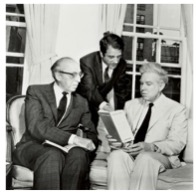Antonín Dvořák, the notable Czech composer, was remarkably instrumental in shaping the art music scene in America. Having built a significant musical reputation in England, Dvořák decided to extend his influence by joining the Institute of Musical Art, which is now famously known as the Juilliard School of Music. His decision led to a profound exploration to discern the essence of American classical music.
Upon his arrival in New York, Dvořák encountered an enthusiastic reception brimming with respect and admiration from the academic staff at his new institution, as well as the wider New York music community 1Beckerman 192-210. This affirmation of his abilities encouraged Dvořák to delve deeper into understanding the American music landscape and its potential.
Dvořák’s time in America marked a transition from European musical traditions to exploring something more culturally divergent. His objective was not just to teach, but he also ventured on a quest – determining the unique aspects that would define the texture of American classical music. He sought to encapsulate the pulse of the nation, its folk tradition, and the myriad narratives of its people and translate them into the classical symphony.
The resulting influence of his work, particularly Symphony No. 9, “From the New World,” embodied the integration of Native American and African-American folk melodies into the European-style symphony. This work, which brilliantly and harmoniously blends these individual components, became a pioneering step in creating a universally recognizable ‘American Sound’ in the classical music lexicon. This was greeted by a great fascination by fellow composer Johannes Brahms, who became friends with Dvořák while he was in England and then re-connected once this symphony was premiered. When the New World Symphony Premiered in Viena, Brahms, and Dvořák sat next to each other to celebrate the moment 2.
Dvořák’s exceptional contribution to the American music scene resonates even today. His commitment to appreciating and incorporating the unique musical culture of America into his compositions gave birth to an evolving new chapter in the history of American music. An affirmation of his esteemed status as an influential figure in American Art Music.
—
Footnotes:
1 Beckerman, Michael, ed. “Letters from Dvořák’s American Period: A Selection of Unpublished Correspondence Received by Dvořák in the United States.” In Dvorak and His World, 192–210. Princeton University Press, 1993. http://www.jstor.org/stable/j.ctt7s5r0.11.
2 BEVERIDGE, DAVID. “Dvořák and Brahms: A Chronicle, an Interpretation.” In Dvorak and His World, edited by Michael Beckerman, 56–91. Princeton University Press, 1993. http://www.jstor.org/stable/j.ctt7s5r0.6.
Bib:
Beckerman, Michael, ed. “Letters from Dvořák’s American Period: A Selection of Unpublished Correspondence Received by Dvořák in the United States.” In Dvorak and His World, 192–210. Princeton University Press, 1993. http://www.jstor.org/stable/j.ctt7s5r0.11.
HOROWITZ, JOSEPH. “Dvořák and the New World: A Concentrated Moment.” In Dvorak and His World, edited by Michael Beckerman, 92–103. Princeton University Press, 1993. http://www.jstor.org/stable/j.ctt7s5r0.7.
BEVERIDGE, DAVID. “Dvořák and Brahms: A Chronicle, an Interpretation.” In Dvorak and His World, edited by Michael Beckerman, 56–91. Princeton University Press, 1993. http://www.jstor.org/stable/j.ctt7s5r0.6.


